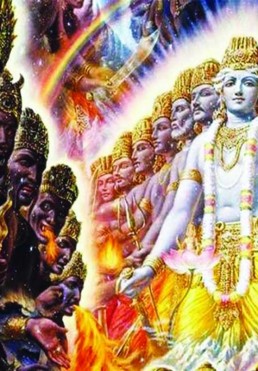Gita Chapter 16 – Verse 11 « »
चिन्तामपरिमेयां च प्रलयान्तामुपाश्रिताः ।
कामोपभोगपरमा एतावदिति निश्चिताः ॥ १६-११॥
cintāmaparimeyāṃ ca pralayāntāmupāśritāḥ
kāmopabhogaparamā etāvaditi niścitāḥ 16-11
Giving themselves over to immeasurable cares ending only with death, regarding gratification of lust as their highest aim, and feeling sure that, that is all (that matters) .
cintāṃ = fears and anxieties; aparimeyaṃ = immeasurable; ca = and; pralayāntāṃ = unto the point of death; upāśritāḥ = having taken shelter of; kāmopabhoga = sense gratification; paramāḥ = the highest goal of life; etāvat = thus; iti = in this way; niścitāḥ = having ascertained;

